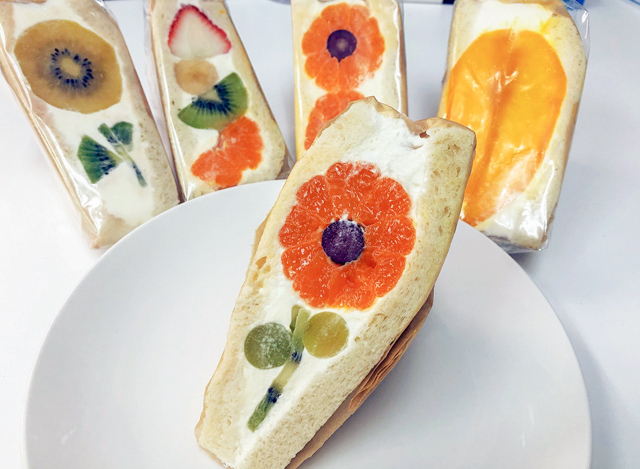
A fruity bouquet of flavour for your taste buds, with a special surprise hidden in the back of each one.
In Japan, 28 June is also known as “Parfait Day”. While many of these unofficial “days”, which honour everything from maids to mayonnaise, are usually formed due to word puns that correlate to dates of the year, the origins of Parfait Day are a little different. On 28 June 1950, Hideo Fujimoto, a baseball pitcher for the Tokyo Giants, scored the first-ever perfect game in Japanese pro baseball, and with “perfect” sounding similar to “parfait”, hey presto — Parfait Day was born.
Now, seven decades after Fujimoto made sporting history that changed the dessert world, our Japanese-language reporter Yuuichiro Wasai found himself looking to celebrate the day with the perfect parfait. One of the places that came highly recommended was Initial in Tokyo’s swanky Omotesando district, so he headed on over, only to stop by this sign outside the store when he arrived.
Initial is known for its “Shime Parfait“, a custom popularised in Sapporo, Hokkaido, with “shime” meaning “last dish”. In Sapporo, it’s become a bit of a fad to finish off the day with a “last dish” of parfait at night, and Initial markets their “Shime Parfait” as being the perfect last dish after eating, after drinking, and after a date. While it wasn’t nighttime when he visited, there’s no rule against having a Shime Parfait in the middle of the day, so it was a bit of a surprise for Yuuichiro to find the store advertising fruit sandwiches instead.
Still, Japanese parfaits mostly contain fruit and cream, so these little morsels were kind of like parfait sandwiches. Even better, they were available for takeout, so Yuuichiro could take them home to enjoy away from the crowds, a pretty important point during the current coronavirus pandemic.
Nine varieties were available, featuring fruits like grapes, strawberries, peaches, bananas, mangoes, mikan citrus, and kiwi fruit.
Yuuichiro was incredibly impressed by the way the fruits were perfectly arranged to look like flowers between two slices of bread, so he ended up purchasing five to take home. He chose the Mixed Fruit (800 yen [US$7.46])…
▼ …The Whole Mikan (800 yen)…
▼ …The Kiwi Fruit Flower (800 yen)…
▼ …And the Miyazaki Mango (1,600 yen), a famous variety of mango known for its high quality and high price.
The one that drew his eye the most, however, was the Mikan Flower (780 yen), which sparkled with bright, juicy colours.
Savoury sandwiches often push their fillings to the front, skimping on ingredients with less fillings at the back end. Given the mesmerising beauty of the fruit on display, Yuuichiro couldn’t help but take a look inside to see if Initial was skimping on ingredients as well.
He lifted one slice of bread and was surprised to discover…
They’d added fruit at the very corner of the sandwich as well, to give customers one last punch of flavour in the final mouthful!
He inspected the other sandwiches as well, and found they all had bits of fruit behind the dazzling floral display piece.
This is what makes Initial’s fruit sandwiches one of the best in Tokyo right now. And that’s saying a lot, as we’ve tried the best of the best fruit sandwiches in the city.
If your mouth is watering right now and you’re unable to make it to Tokyo, don’t worry — this easy-to-follow video will show you how to make floral fruit sandwiches like these wherever you are in the world. Happy eating!
Store information
Initial Omotesando
Address: Tokyo-to, Shibuya-ku, Jingumae 6-12-7
東京都渋谷区神宮前6-12-7
Open: Monday-Friday 1:00 p.m.-11:30 p.m. (last order 11:00 p.m.), Saturday and Sunday 11:00 a.m.-11:30 p.m. (last order 11:00 p.m.)
Photos © SoraNews24
● Want to hear about SoraNews24’s latest articles as soon as they’re published? Follow us on Facebook and Twitter!
[ Read in Japanese ]

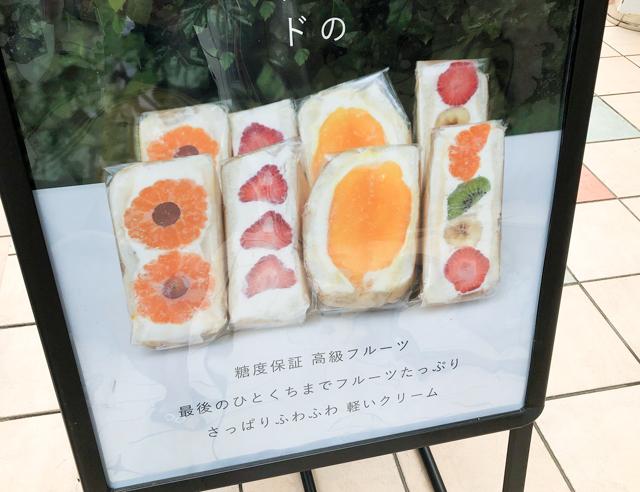
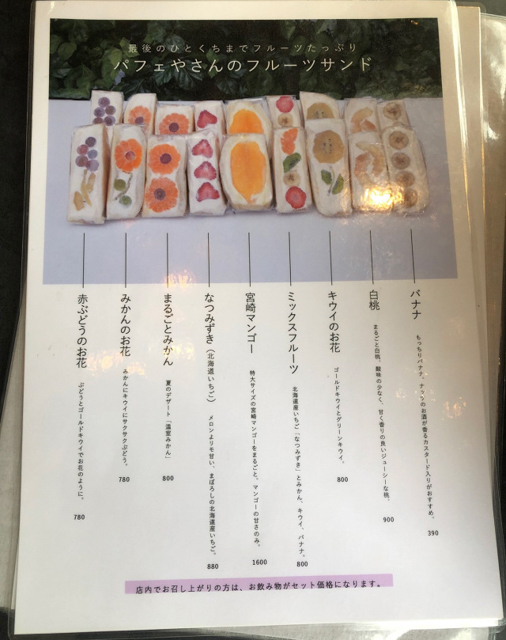
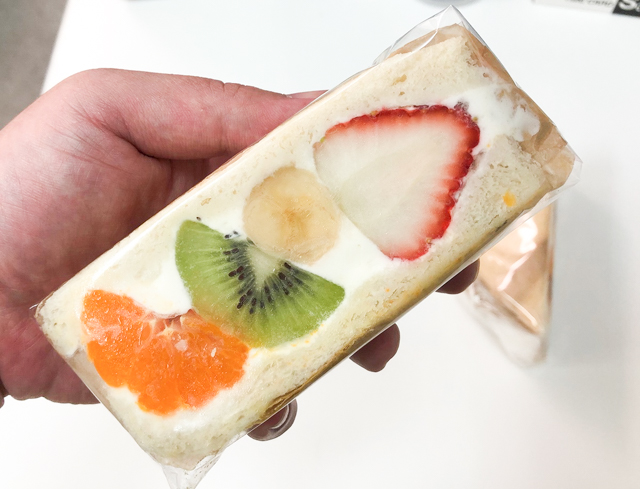
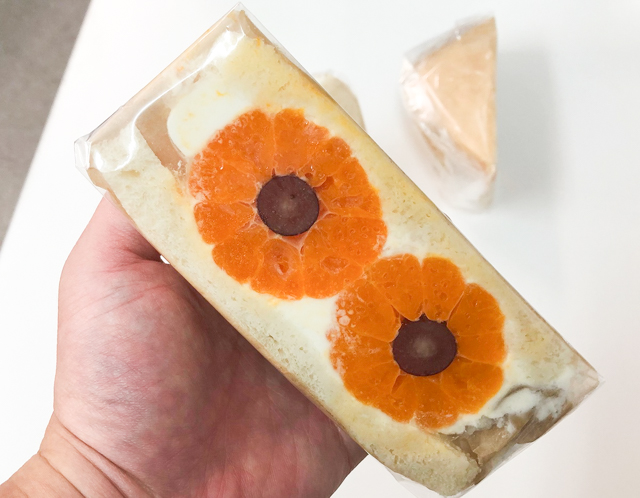
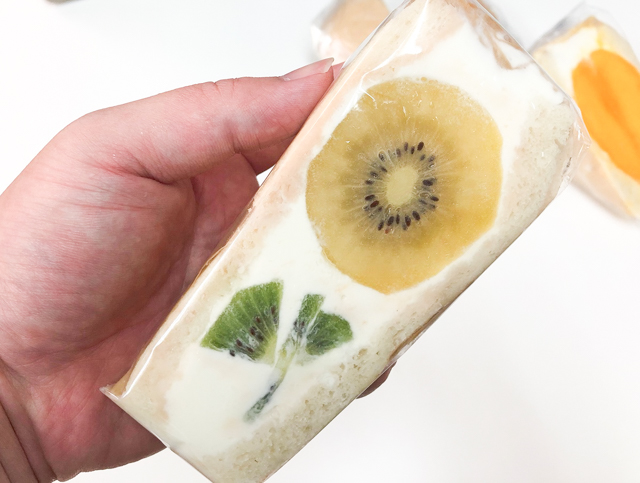
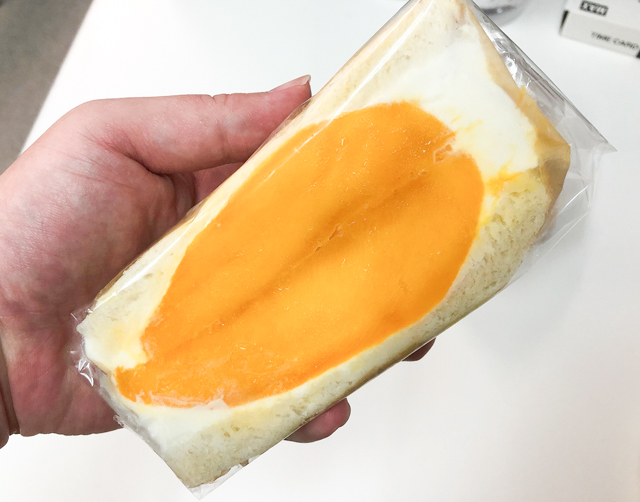
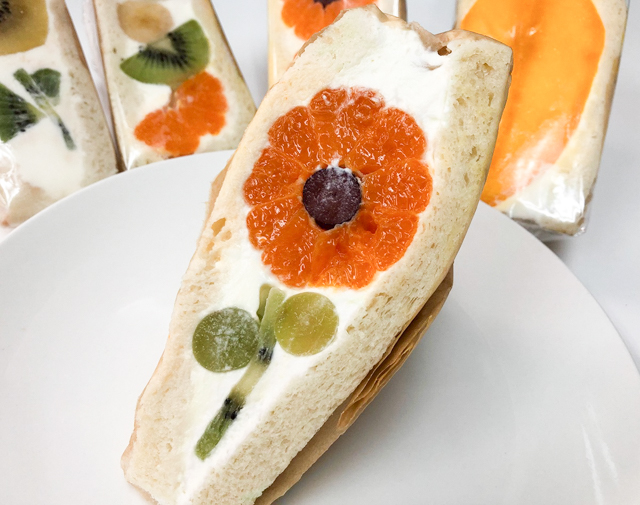
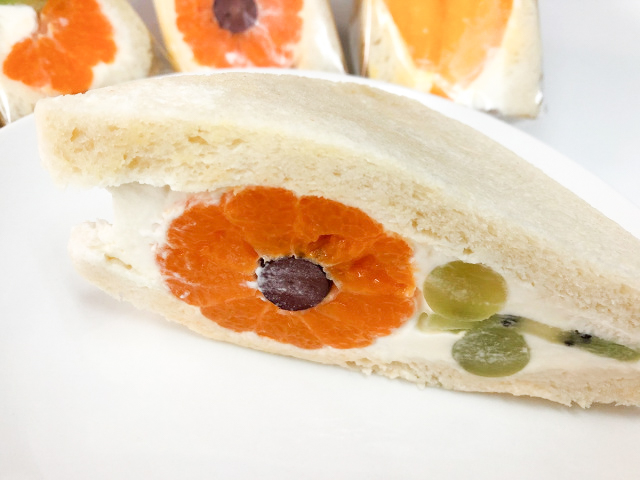
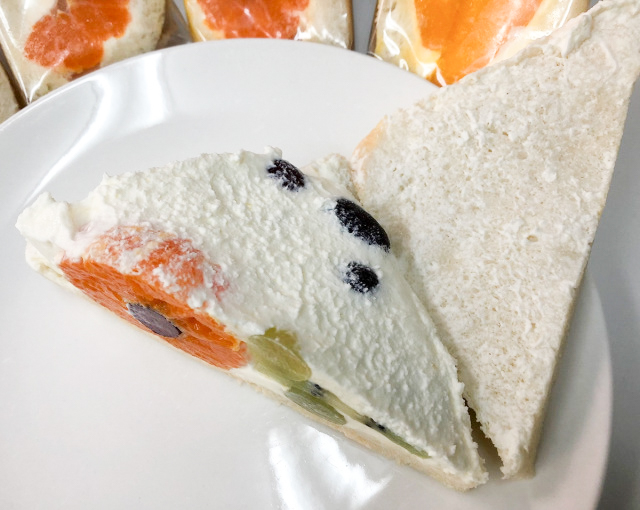

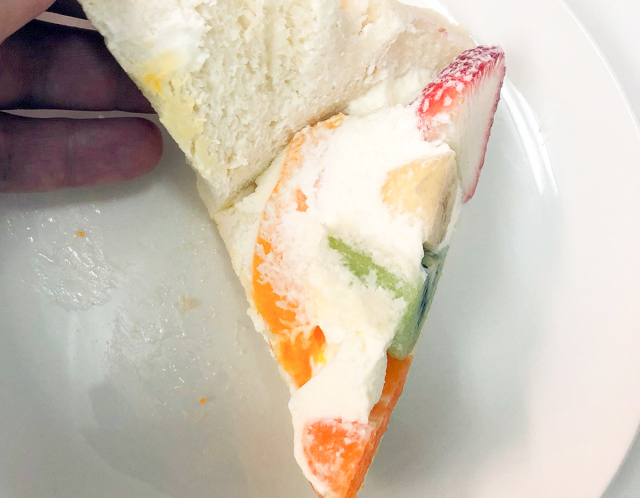
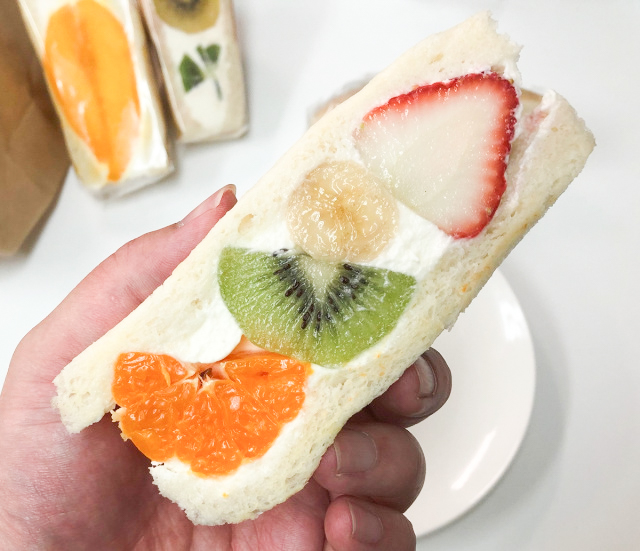
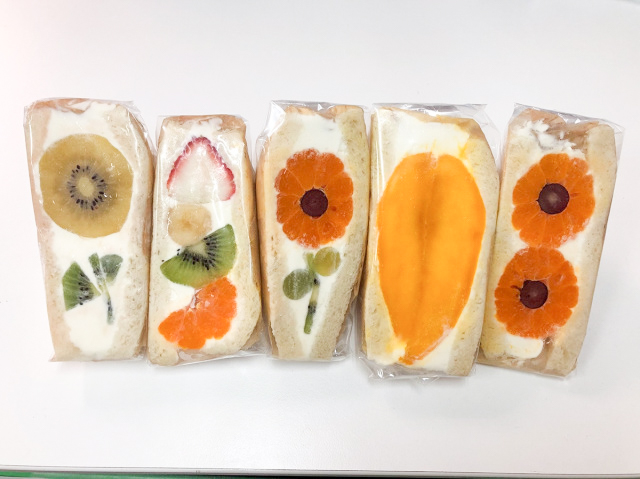
 Tokyo’s beautiful new hot-selling fruit sandwich cubes…are from a 300 yen store?!?【Taste test】
Tokyo’s beautiful new hot-selling fruit sandwich cubes…are from a 300 yen store?!?【Taste test】 Japanese fruit sandwich store in Tokyo explodes in popularity, includes rare, expensive varieties
Japanese fruit sandwich store in Tokyo explodes in popularity, includes rare, expensive varieties Japanese cafe serves up fruit sandwiches like nowhere else
Japanese cafe serves up fruit sandwiches like nowhere else How to make amazing Japanese fruit flower sandwiches
How to make amazing Japanese fruit flower sandwiches Fried sandwiches arrive in Tokyo, become hot topic on social media
Fried sandwiches arrive in Tokyo, become hot topic on social media Kyoto raises hotel accommodation tax to fight overtourism, travelers could pay up to 10 times more
Kyoto raises hotel accommodation tax to fight overtourism, travelers could pay up to 10 times more Viral Japanese cheesecake from Osaka has a lesser known rival called Aunt Wanda
Viral Japanese cheesecake from Osaka has a lesser known rival called Aunt Wanda Lawson adds doughnuts to its convenience store sweets range, but are they good enough to go viral?
Lawson adds doughnuts to its convenience store sweets range, but are they good enough to go viral? The best Hobonichi diaries, covers and stationery for 2026
The best Hobonichi diaries, covers and stationery for 2026 What makes this new Japanese convenience store chain better than 7-Eleven?
What makes this new Japanese convenience store chain better than 7-Eleven? The best cosplayers from Day Two of the Ikebukuro Halloween Cosplay Festival
The best cosplayers from Day Two of the Ikebukuro Halloween Cosplay Festival Haku is…Chihiro’s dead brother? Studio Ghibli fans blown away by Spirited Away theory
Haku is…Chihiro’s dead brother? Studio Ghibli fans blown away by Spirited Away theory Japan’s super easy sweet potato spread lets you make sweet potato bread thanks to Don Quijote
Japan’s super easy sweet potato spread lets you make sweet potato bread thanks to Don Quijote The Hayao Miyazaki anime we never got – New art book reveals Ghibli legend’s unrealized concepts
The Hayao Miyazaki anime we never got – New art book reveals Ghibli legend’s unrealized concepts What’s the deal with akebi, the perfectly purple, alien-like fruit that’s in season now in Japan?
What’s the deal with akebi, the perfectly purple, alien-like fruit that’s in season now in Japan? Starbucks Japan releases first-ever Hinamatsuri Girls’ Day Frappuccino
Starbucks Japan releases first-ever Hinamatsuri Girls’ Day Frappuccino Japanese restaurant chain serves Dragon Ball donuts and Senzu Beans this spring
Japanese restaurant chain serves Dragon Ball donuts and Senzu Beans this spring Highest Starbucks in Japan set to open this spring in the Tokyo sky
Highest Starbucks in Japan set to open this spring in the Tokyo sky Japan Extreme Budget Travel! A trip from Tokyo to Izumo for just 30,000 yen [Part 1]
Japan Extreme Budget Travel! A trip from Tokyo to Izumo for just 30,000 yen [Part 1] Japan has only one airport named after a samurai, so let’s check out Kochi Ryoma【Photos】
Japan has only one airport named after a samurai, so let’s check out Kochi Ryoma【Photos】 Japan Extreme Budget Travel! A trip from Tokyo to Izumo for just 30,000 yen [Part 2]
Japan Extreme Budget Travel! A trip from Tokyo to Izumo for just 30,000 yen [Part 2] Japan’s craziest burger chain takes menchi katsu to new extreme levels
Japan’s craziest burger chain takes menchi katsu to new extreme levels Japanese drugstore sells onigiri at pre-stupid era prices, but how do they compare to 7-Eleven?
Japanese drugstore sells onigiri at pre-stupid era prices, but how do they compare to 7-Eleven? Yakuzen ramen restaurant in Tokyo is very different to a yakuza ramen restaurant
Yakuzen ramen restaurant in Tokyo is very different to a yakuza ramen restaurant Tokyo Skytree turns pink for the cherry blossom season
Tokyo Skytree turns pink for the cherry blossom season Japan’s newest Shinkansen has no seats…or passengers [Video]
Japan’s newest Shinkansen has no seats…or passengers [Video] Starbucks Japan releases new sakura goods and drinkware for cherry blossom season 2026
Starbucks Japan releases new sakura goods and drinkware for cherry blossom season 2026 Foreigners accounting for over 80 percent of off-course skiers needing rescue in Japan’s Hokkaido
Foreigners accounting for over 80 percent of off-course skiers needing rescue in Japan’s Hokkaido Super-salty pizza sends six kids to the hospital in Japan, linguistics blamed
Super-salty pizza sends six kids to the hospital in Japan, linguistics blamed Starbucks Japan unveils new sakura Frappuccino for cherry blossom season 2026
Starbucks Japan unveils new sakura Frappuccino for cherry blossom season 2026 Foreign tourists in Japan will get free Shinkansen tickets to promote regional tourism
Foreign tourists in Japan will get free Shinkansen tickets to promote regional tourism The 10 most annoying things foreign tourists do on Japanese trains, according to locals
The 10 most annoying things foreign tourists do on Japanese trains, according to locals Take a trip to Japan’s Dododo Land, the most irritating place on Earth
Take a trip to Japan’s Dododo Land, the most irritating place on Earth Naruto and Converse team up for new line of shinobi sneakers[Photos]
Naruto and Converse team up for new line of shinobi sneakers[Photos] Is China’s don’t-go-to-Japan warning affecting the lines at a popular Tokyo gyukatsu restaurant?
Is China’s don’t-go-to-Japan warning affecting the lines at a popular Tokyo gyukatsu restaurant? Survey asks foreign tourists what bothered them in Japan, more than half gave same answer
Survey asks foreign tourists what bothered them in Japan, more than half gave same answer Japan’s human washing machines will go on sale to general public, demos to be held in Tokyo
Japan’s human washing machines will go on sale to general public, demos to be held in Tokyo Starbucks Japan releases new drinkware and goods for Valentine’s Day
Starbucks Japan releases new drinkware and goods for Valentine’s Day We deeply regret going into this tunnel on our walk in the mountains of Japan
We deeply regret going into this tunnel on our walk in the mountains of Japan Studio Ghibli releases Kodama forest spirits from Princess Mononoke to light up your home
Studio Ghibli releases Kodama forest spirits from Princess Mononoke to light up your home Major Japanese hotel chain says reservations via overseas booking sites may not be valid
Major Japanese hotel chain says reservations via overseas booking sites may not be valid Put sesame oil in your coffee? Japanese maker says it’s the best way to start your day【Taste test】
Put sesame oil in your coffee? Japanese maker says it’s the best way to start your day【Taste test】 No more using real katana for tourism activities, Japan’s National Police Agency says
No more using real katana for tourism activities, Japan’s National Police Agency says Massive meat sandwich in Tokyo is not your regular Japanese sandwich
Massive meat sandwich in Tokyo is not your regular Japanese sandwich Japanese convenience store’s new chicken katsu sandwich looks deceptive…but is it?
Japanese convenience store’s new chicken katsu sandwich looks deceptive…but is it? Here comes Japan’s newest fruit dessert sandwich: 7-Eleven’s purple Blueberry Sandwich!
Here comes Japan’s newest fruit dessert sandwich: 7-Eleven’s purple Blueberry Sandwich! Matcha parfait looks like a Japanese zen garden, hides a treasure trove of secret surprises
Matcha parfait looks like a Japanese zen garden, hides a treasure trove of secret surprises Häagen-Dazs ice cream sandwich milkshakes now available at pop-up cafe in Tokyo【Taste Test】
Häagen-Dazs ice cream sandwich milkshakes now available at pop-up cafe in Tokyo【Taste Test】 Beautiful cans of cake become a viral hit in Japan
Beautiful cans of cake become a viral hit in Japan Beyond fruit sandwiches — Japan has cake sandwiches too!【Taste test】
Beyond fruit sandwiches — Japan has cake sandwiches too!【Taste test】 Looking for a unique afternoon tea in Tokyo? Have a picnic indoors at Fruit Picnic in Harajuku
Looking for a unique afternoon tea in Tokyo? Have a picnic indoors at Fruit Picnic in Harajuku Japanese convenience store denies use of Nintendo alien labor in new dessert sandwich
Japanese convenience store denies use of Nintendo alien labor in new dessert sandwich Sweet Japanese couple serve jumbo parfaits at hidden underground joint in Osaka
Sweet Japanese couple serve jumbo parfaits at hidden underground joint in Osaka 7-Eleven’s new whipped cream sandwich takes Japanese convenience store food to a whole new level
7-Eleven’s new whipped cream sandwich takes Japanese convenience store food to a whole new level This ridiculously expensive Tokyo sandwich was worth every one of the 8,650 yen it cost us
This ridiculously expensive Tokyo sandwich was worth every one of the 8,650 yen it cost us Can we pick out the expensive Japanese grapes in a blind taste test?
Can we pick out the expensive Japanese grapes in a blind taste test? Japanese sandwiches give foreign reporters culture shock at Tokyo Olympics
Japanese sandwiches give foreign reporters culture shock at Tokyo Olympics Fried chicken, fruits, and ice cream unite in the crazily delicious parfaits of Karafuneya Cafe
Fried chicken, fruits, and ice cream unite in the crazily delicious parfaits of Karafuneya Cafe